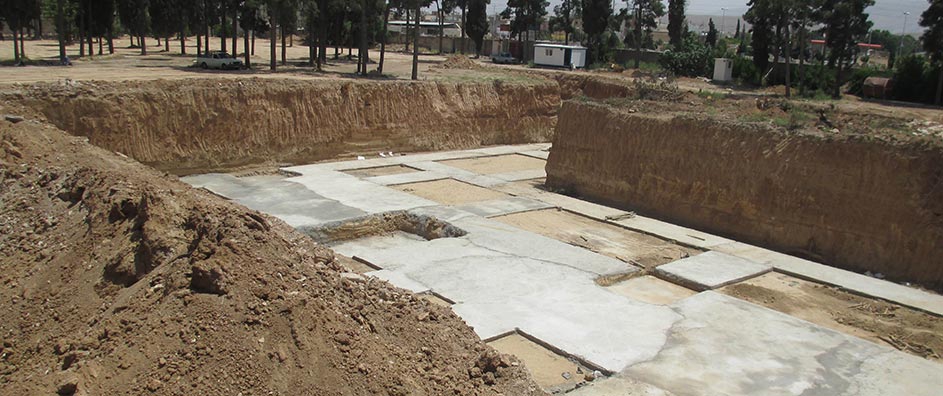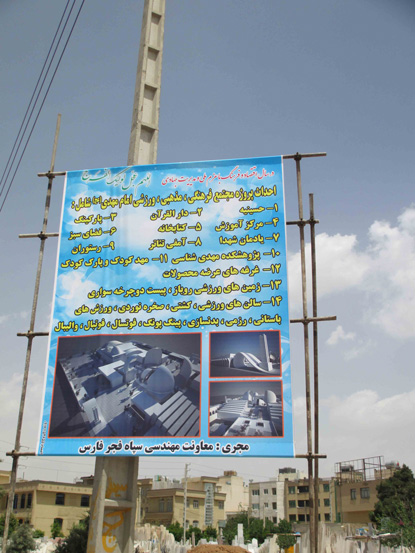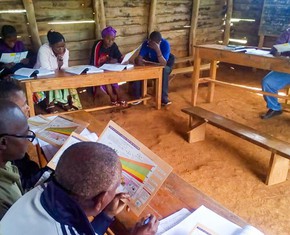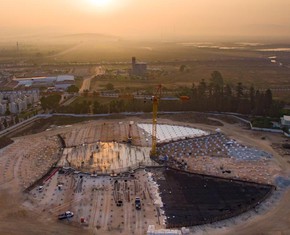So long as religious discord and enmity continue among mankind, the world of humanity will find neither happiness, rest nor composure. – Abdu’l-Baha, The Promulgation of Universal Peace, p. 440.
Fourteen representatives of Dutch faith organizations gathered in The Hague in early July to study the statement made by Ayatollah Abdol-Hamid Masoumi-Tehrani last April on religious coexistence in Iran.
Ayatollah Tehrani gifted an illuminated work of calligraphy to the Baha’is of the world as a “symbolic action to serve as a reminder of the importance of valuing human beings, of peaceful coexistence, of cooperation and mutual support, and avoidance of hatred, enmity and blind religious prejudice”.
Meanwhile, Iran’s Revolutionary Guard resumed its demolition of a historic Baha’i cemetery in Shiraz, Iran, after pausing for several months in the face of international pressure and the expression of outrage on the part of Iranians from all walks of life.
As a prominent Iranian cleric, Ayatollah Tehrani’s courageous act has resonated with individuals and groups throughout the world, inspiring a growing conversation on the need to transcend religious prejudice and intolerance and strive for a harmonious interaction between society’s diverse religious adherents. His action is particularly significant in light of a continued campaign of persecution against Baha’is in Iran, which has witnessed intensification in recent months.
Inspired by Ayatollah Tehrani’s statement, the Dutch religious representatives explored related issues within the Netherlands, discussing how they can exert influence within their own communities to promote peaceful religious coexistence and address any existing attitudes of superiority.
During the same time period in Shiraz, Iran, reports indicate that the Revolutionary Guard has now removed human remains from some 30 to 50 of the 950 graves of Baha’is in the cemetery, placing them in an open canal to make way for the construction of a new cultural and sports complex. In June, the Guards held a public celebration of their progress in clearing the site. In advance of that celebration, to which the media was invited, they used a heavy roller to compact the ground. A carpet was then laid over a number of graves and the commander of the Guards gave a speech attacking Baha’is.
In The Hague, Dutch representatives sent a letter of appreciation to the Iranian Ayatollah which they composed together, stating, “We wish to wholeheartedly support your efforts, by working for the eradication of notions of religious intolerance in our country and to take practical initiatives to eliminate conflict from our society and foster instead love and fellowship, solidarity and altruism.”
“We firmly believe that this is the mission called for by our respective religious scriptures and traditions, our prophets and saints,” they said.
“We are aware that much patient and persistent work remains to be done, that we should especially accompany the youth of our communities and society at large in their endeavor to serve society…”
“We stand ready to work together in this mighty and glorious enterprise – the building of a collective conscience – in which we feel united with you and the many other people of goodwill in Iran and beyond,” the letter concluded.
Ayatollah Masoumi-Tehrani’s statement has evoked responses from diverse religious figures around the world, including in the Middle East where Islamic leaders on three continents have raised their voices in support of his gesture and the content of his message.
The ongoing destruction of the Baha’i cemetery in Shiraz prompted this response from Diane Ala’i, the representative of the Baha’i International Community to the United Nations in Geneva: “The manner in which the Revolutionary Guards have gone about destroying these sacred grounds and, now, celebrating its demolition goes beyond the pale in terms of humane behavior.”
“Clearly, this latest action – a public celebration held upon the graves of innocent people – is an attempt by the Guards to justify to an increasingly outraged Iranian public the desecration of the cemetery and the treatment of Baha’is generally,” she said.
“We call on the government of Iran to immediately put a stop to this desecration, and we ask the international community to likewise voice its concerns about this outrageous development,” said Ms. Ala’i. According to Ms. Ala’i, members of the Shiraz Baha’i community have pleaded with local authorities to enforce a permanent halt in the construction, offering also a compromise in which the sports complex could be built on the site away from areas where Baha’is are buried, while the graveyard itself is turned into a green space.
The Baha’is have been told, however, that local authorities have no control over the Revolutionary Guards, who acquired the land about three years ago. Demolition of the cemetery – established in the 1920s – was first begun in late April with the digging of a large, shallow excavation. That was halted after the international media reported on the desecration and other governments expressed concern.
More recently, however, concrete has been poured for a foundation, and a number of signs have been posted proclaiming the Guards’ plan to build a sports and cultural complex that will include a library, mosque, restaurant, theatre, child care facility, and sports hall.
Of note, during the public celebration of the demolition’s progress, held on June 14th, the commander of the Revolutionary Guards of Fars Province, gave a speech attacking Baha’is and calling the Baha’i Faith a “foul”, “perverse sect”. According to IranWire, this same commander or another high-ranking official in the Revolutionary Guards of Fars Province subsequently stated, “We will use a vehement approach with those who teach about the perverse sect in this province…. Their religion, or sect, is not genuine.”
At the same time, Baha’is in the province have given voice to their deep anguish over the site’s destruction. In an open letter written to local authorities in May, for example, a 50-year-old Baha’i woman spoke of facing decades of oppression, capped now by this latest attack on a place where the bodies of her father, mother, and sister – who were all killed by the government in the 1980s – had been laid to rest.
“Yesterday…the cemetery where the bodies of my beloved family were buried was dug up and the soil was loaded onto trucks and taken away, so that no trace of evidence would be left of the crimes and atrocities committed by you over the past thirty years,” she wrote.
“End this long-standing rancor and enmity,” she said. “We are your countrymen, your fellow citizens, your neighbors, your family, and your relatives. We work for the dissemination of love; we adore affection and kindliness; and believe we all have a right to the life which God has bestowed upon us.”

















Comments
Sign in or create an account
Continue with Googleor